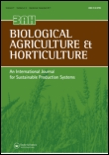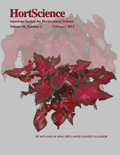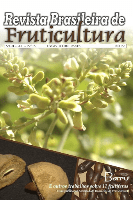
Acta Scientiarum Polonorum-Hortorum Cultus
Scope & Guideline
Connecting Researchers for a Greener Tomorrow.
Introduction
Aims and Scopes
- Plant Growth and Development:
Research on the physiological and biochemical aspects of plant growth, including the effects of various environmental factors, nutrients, and growth regulators. - Soil and Nutrient Management:
Studies focusing on soil health, nutrient management strategies, and the impact of different fertilizers and amendments on plant performance. - Crop Protection and Pest Management:
Investigations into methods for controlling pests and diseases in horticultural crops, including the use of biocontrol agents and organic practices. - Postharvest Technology:
Research on maintaining the quality and extending the shelf life of horticultural products through various postharvest treatments and technologies. - Biotechnology and Genetic Studies:
Application of biotechnological techniques in plant breeding, genetic analysis, and the development of disease-resistant or high-yielding cultivars. - Sustainable Practices in Horticulture:
Exploration of sustainable agricultural practices, including organic farming, integrated pest management, and the use of biostimulants.
Trending and Emerging
- Biostimulants and Organic Amendments:
Increasing research on the application of natural biostimulants and organic amendments to enhance plant growth and resilience, reflecting a shift towards sustainable agriculture. - Nano-technology in Horticulture:
Emerging studies on the use of nanomaterials, such as nanoparticles for nutrient delivery and pest control, indicating a growing interest in advanced agricultural technologies. - Climate Resilience and Stress Tolerance:
A significant increase in research addressing plant responses to abiotic stresses, such as drought and salinity, highlighting the need for climate-resilient horticultural practices. - Genomic and Biotechnological Advances:
A rise in the application of genomic tools and biotechnology for crop improvement, including gene editing and marker-assisted selection, reflecting advancements in plant breeding. - Functional Foods and Nutraceuticals:
Emerging focus on the health benefits of horticultural products, emphasizing the nutritional and medicinal properties of various plant species.
Declining or Waning
- Traditional Cultivation Techniques:
Research on conventional farming practices has decreased, potentially overshadowed by the growing interest in sustainable and organic methods. - Chemical Pest Control Methods:
There is a noticeable decline in studies focusing on chemical pesticides, as the horticultural community shifts towards more environmentally friendly pest management strategies. - Static Agricultural Models:
The use of static models for predicting crop yields and growth has waned in favor of more dynamic and integrative modeling approaches that account for changing environmental conditions.
Similar Journals

BIOLOGICAL AGRICULTURE & HORTICULTURE
Advancing sustainable practices in agriculture and horticulture.Biological Agriculture & Horticulture, published by Taylor & Francis Ltd, stands as a pivotal journal in the realms of agronomy and horticultural sciences. With an ISSN of 0144-8765 and an E-ISSN of 2165-0616, this esteemed journal has been disseminating vital research since its inception in 1982 and continues to publish leading studies through 2024. It currently boasts a commendable Q2 quartile ranking in both Agronomy and Crop Science as well as Horticulture, placing it in a prominent position within the academic community. With Scopus rankings indicating a 70th percentile in Horticulture and a 62nd percentile in Agronomy and Crop Science, the journal is a key resource for researchers, professionals, and students focused on innovative practices and scientific advancements in biological agriculture. While the journal is not open access, it remains an invaluable repository for cutting-edge research, methodologies, and reviews that push the boundaries of agricultural and horticultural sciences.

Agrivita
Empowering researchers to cultivate groundbreaking agricultural insights.Agrivita is a distinguished, open-access journal dedicated to advancing research and knowledge in the fields of Agronomy and Crop Science. Published by Brawijaya University, Faculty of Agriculture, this journal has been providing a platform for high-quality scholarly articles since 2010. Located in the vibrant country of Indonesia, Agrivita plays a vital role in the exchange of innovative agricultural research, particularly within the Southeast Asian context. As of 2023, it holds a respectable Q3 ranking in its category, showcasing its commitment to scholarly excellence and visibility. With an increasing impact on the academic community, and its current Scopus rank placing it in the 48th percentile, Agrivita stands as a crucial resource for researchers, professionals, and students eager to deepen their understanding of crop science and agronomy. The journal's scope encompasses cutting-edge research that addresses both fundamental and applied aspects of agriculture, ensuring it remains relevant to today's pressing agricultural challenges. Its open access model enhances global accessibility, fostering a collaborative environment where diverse opinions and findings can converge.

AGROCHIMICA
Cultivating insights for a resilient agricultural landscape.AGROCHIMICA is an eminent journal published by PISA UNIV PRESS, dedicated to advancing the fields of Agronomy, Crop Science, Food Science, and Soil Science. With a rich history dating back to its inception in 1973, this journal has evolved through various phases of publication, illustrating its commitment to delivering quality research over several decades. Although currently categorized in the Q4 quartile across its respective disciplines, AGROCHIMICA provides a platform for foundational and innovative studies that contribute to knowledge in agricultural practices and sustainable food systems. While the journal is not open access, it remains a valuable resource for researchers, professionals, and students interested in Italy's and the global agricultural landscape, fostering a greater understanding of the complexities within these interconnected fields. The ISSN associated with this journal is 0002-1857, and it is published from Pisa, Italy, addressing the evolving challenges in agriculture with a spotlight on rigorous scientific inquiry.

Zemdirbyste-Agriculture
Empowering the agricultural community through open access insights.Zemdirbyste-Agriculture is a prominent journal dedicated to advancing the field of agricultural sciences, with a particular focus on agronomy and crop science. Published by the Lithuanian Research Centre Agriculture & Forestry, this open access journal has been fostering knowledge sharing and scientific discourse since 2004, allowing researchers, professionals, and students unrestricted access to its content. Located in the beautiful country of Lithuania, specifically at Vytautas Magnus University, this journal plays a significant role in disseminating innovative research findings. With a 2023 Scopus ranking of #246 out of 406 in the category of Agricultural and Biological Sciences, Zemdirbyste-Agriculture falls within the Q3 quartile, reflecting its growing influence in the academic community. This journal, which has converged its publication focus from 2008 to 2023, aims to provide a platform for scientists to share their critical insights on agricultural practices, sustainability, and technological advancements in crop science, thereby contributing to the global discourse on food security and environmental health.

HORTSCIENCE
Connecting science and practice in horticultural education.HORTSCIENCE is a prestigious journal published by the American Society for Horticultural Science, focusing on the latest research and developments in the field of horticulture. With an ISSN of 0018-5345 and an E-ISSN of 2327-9834, this journal has established itself as a vital resource for horticultural scientists, practitioners, and educators since its inception. As of 2020, it has embraced an Open Access model, promoting the dissemination of scientific knowledge and enabling wider accessibility to its rich content. HORTSCIENCE currently holds a Q2 ranking in the Horticulture category for 2023, placing it in the top tier of its field with a Scopus rank of 36 out of 115 in the area of Agricultural and Biological Sciences. This journal publishes empirical research, significant advancements, and comprehensive reviews that contribute to the understanding and improvement of horticultural practices, making it an essential publication for anyone involved in horticultural research or education.

Horticultural Science & Technology
Advancing horticultural innovation for a sustainable future.Horticultural Science & Technology is a leading journal in the field of horticulture, published by the Korean Society of Horticultural Science. With an ISSN of 1226-8763 and an E-ISSN of 2465-8588, it serves as a critical platform for disseminating cutting-edge research and advancements in horticultural science worldwide. The journal holds a prestigious Q2 category ranking in Horticulture for 2023, placing it among the top half of its field, as reflected by its Scopus rank of #56 out of 115. Operating from South Korea and backed by institutional affiliations with the National Institute of Horticultural & Herbal Science, the journal aims to promote innovative agricultural practices and sustainable horticultural techniques. Its open-access model ensures that research findings are readily available to both professionals and academics, fostering collaboration and knowledge sharing in the global horticultural community. As it continues to evolve through its converged years from 2008 to 2024, Horticultural Science & Technology remains an invaluable resource for scholars, practitioners, and students dedicated to advancing the art and science of horticulture.

Revista Brasileira de Fruticultura
Innovating Horticulture for a Sustainable FutureRevista Brasileira de Fruticultura, published by the Sociedade Brasileira de Fruticultura, is a leading scholarly journal dedicated to the advancement of research in the fields of agronomy, crop science, food science, horticulture, and plant science. With an impressive Open Access model adopted since 2001, the journal is committed to disseminating high-quality research from Brazil and beyond, promoting innovation and collaboration among researchers, professionals, and students alike. The journal currently holds a respectable Q3 category ranking in multiple fields as of 2023, reflecting its significance within the scientific community, specifically ranked #72 in horticulture and #257 in agronomy, among its peers. The Revista Brasileira de Fruticultura not only serves as a platform for original research articles, reviews, and case studies but also emphasizes practical applications and sustainable practices in fruit cultivation. Its aim is to enhance the visibility of Brazilian fruit research on a global scale, making it an invaluable resource for those invested in advancing horticultural sciences.

Scientific Papers-Series B-Horticulture
Cultivating Knowledge, Growing Futures.Scientific Papers-Series B-Horticulture is a distinguished open-access journal published by the University of Agronomic Sciences and Veterinary Medicine Bucharest. With its ISSN 2285-5653 and E-ISSN 2286-1580, this journal has been accessible to the global research community since 2002, ensuring that vital horticultural research reaches a wide audience without barriers. Positioned at the forefront of the horticultural sciences, the journal serves as a platform for original research, reviews, and innovations pertaining to horticultural practices, plant physiology, and sustainable agriculture. Its contributions are not just significant in Romania but also resonate through the international scientific community, helping to address pressing agricultural challenges. The office located at 59 Marasti Boulevard, District 1, Bucharest 011464, Romania, symbolizes its commitment to advancing horticultural knowledge and fostering collaboration among researchers, professionals, and students alike. With no current H-index data, the journal invites continued contributions to enhance its visibility and impact in the field.

Ornamental Horticulture-Revista Brasileira de Horticultura Ornamental
Sowing Seeds of Knowledge in HorticultureOrnamental Horticulture - Revista Brasileira de Horticultura Ornamental, published by the SOC BRASILEIRA FLORICULTURA & PLANTAS ORNAMENTAIS, serves as a premier platform for disseminating high-quality research in the field of ornamental horticulture. With an Open Access model in place since 1995, this journal ensures that valuable findings in horticultural science reach a wide audience, fostering greater collaboration within the global community. Based in Brazil, this journal primarily focuses on the cultivation, management, and improvement of ornamental plants, contributing significantly to both the scientific and practical aspects of the horticulture industry. It has achieved esteemed rankings, including being classified in the Q2 quartile for Horticulture and Q3 for Plant Science in 2023, demonstrating its academic rigor and relevance. Scopus ranks it at 54th in Horticulture and 278th in Plant Science, positioning it among leading scholarly resources in these fields. The journal is committed to advancing knowledge through innovative research that aids in the sustainable development of ornamental horticulture practices.

EUROPEAN JOURNAL OF HORTICULTURAL SCIENCE
Illuminating the path of horticultural research and innovation.The European Journal of Horticultural Science, an esteemed publication of the International Society for Horticultural Science (ISHS), serves as a pivotal platform for advancing the field of horticulture since its inception in 2003. With its base in Germany, this journal occupies a significant position in the Q3 quartile of horticultural research, confidently ranked #60 out of 115 in the Agricultural and Biological Sciences category on Scopus, reflecting its relevance and impact within the scholarly community. The European Journal of Horticultural Science fosters open access to a wealth of research and insights, facilitating knowledge sharing among researchers, professionals, and students dedicated to the innovative and sustainable practices in horticultural science. As it embarks on a new chapter through its convergence years leading up to 2024, the journal aims to enhance the dialogue on contemporary horticultural challenges and advancements, making it an essential resource for those seeking to contribute to and learn from ongoing developments in this vital field.